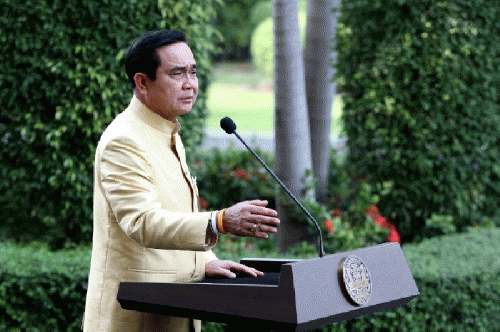While he was in the nation's capital for the Nuclear Industry Summit on Wednesday night, Thailand's military strongman Prayut Chan-o-cha said his country was "eventually" going to have to join the corporate-backed Trans-Pacific Partnership (TPP) being pushed by the Obama administration and backed fervently by business lobbyists and corporate interest groups (impact on American workers be damned). Prayut's comments, which were made in a speech before the U.S.-ASEAN Business Council and the U.S. Chamber of Commerce, pointed out that Thailand's industries would need to undergo serious restructuring to meet the TPP's stringent intellectual property and other rules, going so far as to ask the audience to "take care of Thailand" as it overhauls its own economy to meet TPP standards.
Officially, the Thai junta leader's position reflects fears that his country would be left out in the cold as neighbors like Vietnam and Malaysia enjoy the fruits of free trade. The TPP's proponents and the corporations that stand to profit most from the implosion of trade protections have highlighted how these Southeast Asian economies will reap windfalls of jobs and growth. They do so while glossing over the millions of American jobs that have already disappeared as a result of free trade agreements--not to mention the additional perks the TPP will offer corporations for taking jobs overseas. Unofficially, Prayut's nod to one of Obama's signature initiatives is just as much a way of getting back on Washington's good side. This is all the more likely given the (mild) heat Bangkok's ruling general got from the State Department on account of their human rights abuses and manipulated return to "democracy."
Ever since Prayut and his fellow generals staged a coup and overthrew Thailand's elected government in May 2014, what was once a democratic American ally has taken a dramatically authoritarian turn under a leader who can be downright cartoonish in his attacks on opponents and peaceful activists. Since the military takeover, political activity and public gatherings have been banned and hundreds have been arrested. Both Thais and foreigners who criticize the government or its actions have been dragged before the courts on defamation charges, with Thailand's harsh laws against disparaging the monarchy have turned into a favorite weapon of the authorities. Journalists, activists, and private citizens have also been brought up on charges after highlighting the rights abuses of private companies and joking about the King's favorite dog on Facebook.
One of the latest victims of the military's uncompromising persecution of critics (real or imagined) is Theerawan Charoensuk, a woman who faces up to seven years in prison just because she posted a photo of herself holding a red bowl. What makes that red bowl so threatening to Thailand's generals? Innocuous New Year's greetings from former Thai premiers Thaksin and Yingluck Shinawatra, populist leaders who antagonized Bangkok's entrenched elites and lost their positions not through the ballot box but through military takeovers. To the U.S. diplomats and other outside groups who still have the gall to criticize the Thai junta for its crackdown on people like Theerawan, Prayut offers a blunt answer: "Why don't people respect the laws instead of asking for democracy and human rights all the time" No one is allowed to oppose [the NCPO, the official name for the junta]. I dare you to try to oppose [the NCPO].... I don't care what the international community would think about this. I will send officials to explain to foreign embassies. "
While the coup leaders lash out at foreign and domestic critics for any sign of dissent, they have also put together a rigged transitional process to return the country to "democracy", while carving out a deep state for themselves. Just a few days ago, the junta unveiled its newest draft constitution. Naturally, criticism of the document was outlawed before it went public. According to the government's schedule, Thais will have the chance to vote on the draft in an August referendum this year. If they approve of the document, Prayut has promised elections for a civilian government in 2017. Previous constitutional drafts proposed by the military brass have already been rejected because they would have granted the military too much enduring power, but this latest version appears to be no different. The entirety of Thailand's 250-member Senate, for example, would be appointed as opposed to elected. Those senators would be chosen by an "independent" selection panel, although the six highest-ranking members of the armed forces would automatically be included to avoid any" misunderstandings between the soldiers and the politicians that could prompt another armed takeover.
Along with its control of the senatorial selection process, the military's draft also leaves open the door to appointing the prime minister. If it seems as if Thailand's generals want to take power out of the hands of Thai voters that should come as no surprise: the Shinawatra family has won every election since 2001, and a large part of the thinking behind military rule is to make sure their political movement can't pick up where it left off.
After nearly two years of rights abuses and pseudo-democratic charades, the U.S. government finally seems to be speaking up about events in Thailand. Sarah Sewell, who runs democracy and human rights work at the State Department, met with the Thai premier on March 28 and "urged" him to restore democratic governance and respect the freedom of expression. Those statements, though, have yet to be backed up by any real actions. This year's edition of joint military exercises between American and Thai troops, for example, was supposedly scaled back in light of the political situation, but even so, nearly 3,300 U.S. soldiers still took part.
If America is truly serious about Thailand's return to democracy, making vague statements while inviting Prayut to Washington and getting him to sign up for the TPP are not the way to go about it.





